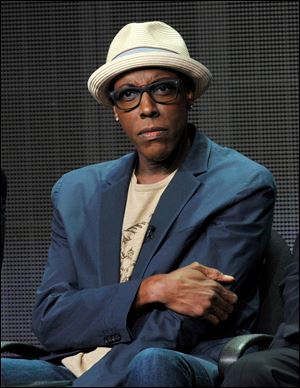
Arsenio Hall picks up where he left off with return to late night
9/5/2013
After two decades, Arsenio Hall is returning to late night television with 'The Arsenio Hall Show,' premiering Monday.
NEW YORK — A flashback. Make that a very distant flashback — to May 27, 1994.
“I’d like to thank America,” said the gifted, black late-night host in a sharply bespoke suit — mauve, if memory serves, however dimly — on the last night of his celebrated show, where he liked to say “Hollywood meets the ‘hood.”
“But most of all, I’d like to thank God: This has been the greatest 5½ years anyone could ever hope for.” Then, turning his eyes to the camera, this:
“I won’t see you in 23 hours, but I will see you again.”
Promise kept.
Arsenio Hall returns with a new late-night show beginning at 11 p.m. Monday on WUPW-TV, Channel 36. In a recent phone interview about his hopes (and dreams) for this return, Hall almost reflexively said, “I don’t need to be on the cover of Time magazine, but I’d love to just be in the game.”
About that magazine: On Nov. 13, 1989, when such coronations really mattered, Time crowned Hall with a cover declaiming him the coolest kid on the late-night TV block. The Arsenio Hall Show, which launched Jan. 3, 1989, had brought an urban beat and party-every-night vibe to a moment of the TV day that been dominated by Johnny Carson and his sensibilities for nearly three decades. About 4 million tuned in every night, denting Carson’s Tonight ratings and even — if you believed some of the hype at the time — accelerating his retirement plans. Hall’s show didn’t feel like an alternative as much as a movement, to bring black culture into an all-white club. Studio audiences loved it. So — for a time — did audiences at home.
Then, on May 27, 1994, the party ended. Hall had it all, then lost it all.
Why did he leave Stage 29 on the Paramount lot in the first place, and why is he back on another stage? (The new show will be taped at the Sunset Bronson Studios in Hollywood.) The saga is complicated, but it’s also clear that the answers to both questions are related. Hall thrived, then left as the tectonic plates of late-night TV shifted. They are about to shift once again. Jay Leno will leave Tonight in February, while the future of Late Show With David Letterman — though certainly secure for now — is a question. Audiences tend to check around when hosts change; that was true in the early ’90s, and it still holds true.
As Hall said recently, “Obviously, back in the day, I was trying to take anything that was left over on Carson’s plate. It’s a huge challenge this time to bring people to the television. But I know that everybody doesn’t have a late-night host.”
Born in Cleveland 57 years ago, Hall early found an aptitude for magic, debate — and comedy. After graduating from Kent State, he headed west — first to Chicago, then Los Angeles, in search of a stand-up career, and landed at West Hollywood’s Comedy Store, one of the premiere venues for budding and established comics, and where former club MC and future Hall writer Steven Alan Green recalled Hall as someone with “incredible positive energy.”
That energy landed him gigs on TV and ultimately Fox’s The Late Show, where he was the show’s last host before it was canceled in 1988.
Fox wanted him to stick around, but after Late Show, Hall signed a deal with Paramount to star in Eddie Murphy’s Coming to America. After that, Paramount created his late-night syndicated vehicle, which Hall was prescient enough to secure an ownership stake in. It was an instant success: He embraced black culture, especially rap, which secured its most important TV venue, after Soul Train and American Bandstand, to date. For a brief moment, the show was believed to be Paramount’s most financially successful TV venture, a $40-million-a-year machine.
Then, things changed. CBS, which launched Letterman’s show in ’93, pulled Arsenio off some of its own big stations for the new venture. Arsenio ratings, which already had been dropping, plummeted. Relations with Paramount went from bad to worse.
Hall now insists there was “never anything negative” in the split, but that he told Paramount, “I needed balance in my life. Not only personally, but professionally. I wanted to try other things."